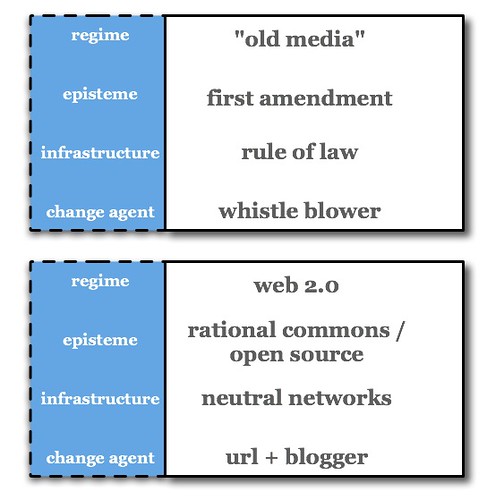I found myself in the advantageous position of having both Yochai Benkler and Mimi Ito at the same supper table. I puzzled over what was the one question I would want them both to answer — something that went beyond framing particular practices of cultural production and its meaning. So, I asked them both — what is your future imaginary world? Based on what you know, your stakes, your opinions — your research — what would you aspire to create as a more habitable, sustainable world?
Benkler gave a number of examples during his talk about how the network and some common super heros effected worldly change. While he was giving these examples, I quickly thought about a decision I had made in the morning about what shirt to wear. One option was my Daniel Ellsberg t-shirt. The other was a short sleeve buttoned number. I opted for the buttoned shirt, but the Ellsberg option lingered. I thought about what it took to be an agent of change during the regime of “old media.” The agent of change, or one of them, was superhuman in their will, commitment and daring-do — it was the Whistle Blower. (As a matter of fact, that Daniel Ellsberg t-shirt was from a series of t-shirts that the artist / designer Raegan Kelly had done exclusively dedicated to Whistle Blowers.) What an effort and what stakes to be a super hero / change agent of that scale. How many of us could conceive of striving against “the Pentagon” (and everything else that systemically supports that institution) so as to publish some documents spirited out of the RAND Institute.
Today, Ellsberg would just blog the Pentagon Papers. Open source, neutral networks would allow that. Even if the Cease & Desist letters came in, once it got out — one would be hard pressed to even find a way to expunge the documents from today’s P2P networks.
The examples that Benkler gave of common super heros effecting worldly change came across as almost routine examples. Someone in a condo complex somewhere stumbles across some emails from some guy at some corrupt government contractor trying to screw over the American public. We chuckled at the fumblings of institutions that sought to suppress Diebold’s voting machine software and other similar “old regime” attempts at squelching the will of common, everyday super heros. It’s all routine, it’s just how things happen. The Ellsberg’s of tomorrow — the digital kids? — they’ll just register a domain name and set up a blog. They won’t even have to muster the ACLU lawyers out of bed.
My own stakes and aspirations are that all of this networked publics “stuff” (to quote Mimi!), will hopefully lead to a world in which individuals (digital kids) grow up with the sense that they are full enrolled, first-class participants in the polity and that they have a to-the-bones, intuitive sense that they can effect worldly change with some ideas, an articulate voice, and an $8.95 domain name.
This is far more than simple civics 101 from the 1980s. This would be the sense that “I can make things happen and change the way things are. I can be a common super hero and, in fact, there are an enormous number of super heros in the world who right wrong and suppress evil, greed and wrong-doing.
Why do I blog this? It’s the stakes: creating a world in which we (or the digital kids) have a sense of participation and a conviction that change is possible, and that individuals with ideas and aspirations for creating more habitable and sustainable worlds, can be common super heros — agents of change, without the kinds of burdens we normally associate with being a super hero..like lawyers fees and the threat of having your family’s life destroyed.
